Health Equity Division Newsletter - April 2025

In this newsletter:
Greetings from the Health Equity Strategy and Innovation Division
Message from the Director
CONNECT: Feature on the Health Equity Networks
STRENGTHEN: Grantee Spotlight: Empowering Somali Women
AMPLIFY: Guest story on the Family Support Organization Collaborative
Greetings from the Health Equity Strategy and Innovation Division
We share this spring newsletter with heavy hearts. As many of you know, MDH received an abrupt notice last month that the federal government was cancelling more than $220 million of taxpayer dollars that were dedicated to the health of Minnesotans. It was Tuesday, March 25, when we were notified that the funding was terminated on Monday, March 24, giving us no time prepare, plan, or give notice to our partners. This action was sudden, unexpected, and unprecedented.
Since then, workforce reductions have impacted approximately 200 public servants across the agency—this includes full-time staff, temporary staff, contractors, and offers that had to be rescinded. In our division, we lost many beloved colleagues to layoffs. These were dedicated, talented staff who were working for the health of our state, many of whom had been working at the department for years and had deep relationships and institutional knowledge of our work to advance equity. We’ve also had to cancel numerous grants and programs directly helping Minnesota families and communities, including 44 contracts to COVID-19 Community Coordinator partners and 11 grants to partners through the Health Equity Networks team. It’s been heartbreaking to see how much damage to public health and to our progress to advance equity these actions have created in a matter of weeks.
While we’ve been reeling from the loss of our colleagues and partners, we've also been working to fight back. Minnesota joined 22 other states and the District of Columbia in bringing a lawsuit against the federal government for these harmful actions. At the time of this newsletter, a temporary restraining order is in place to temporarily restore funding. While this is a hopeful step, much uncertainty remains about the future of our work, our partnerships, and our funding.
Amid all of this chaos and uncertainty, one thing remains clear: our commitment to advancing health equity remains unwavering. If anything, it has deepened. In this issue's Message from the Director, Division Director Odi Akosionu-DeSouza will speak more to the effects of the funding loss and what these uncertain times demand of us.
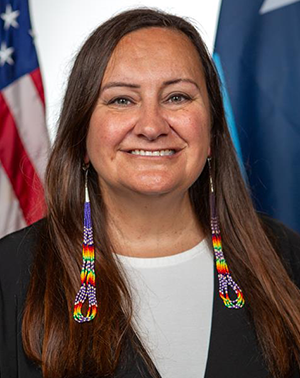 In the meantime, we want to also make sure to acknowledge a big leadership change since our last issue. We are pleased to welcome equity champion Kris Rhodes as the interim assistant commissioner for the Health Equity Bureau. Rhodes stepped into her new role in early January 2025 while continuing to serve as the director of the Office of American Indian Health. We have been truly fortunate to have Rhodes’ person-centered, bold, and unshakable leadership during this difficult time.
In the meantime, we want to also make sure to acknowledge a big leadership change since our last issue. We are pleased to welcome equity champion Kris Rhodes as the interim assistant commissioner for the Health Equity Bureau. Rhodes stepped into her new role in early January 2025 while continuing to serve as the director of the Office of American Indian Health. We have been truly fortunate to have Rhodes’ person-centered, bold, and unshakable leadership during this difficult time.
We also want to extend our heartfelt gratitude to our previous assistant commissioner, Dr. Halkeno Tura, as he transitions to a new role. Dr. Tura, your leadership during the early days and ongoing growth of the Health Equity Division and now the Health Equity Bureau has been truly exceptional. Thank you for your unwavering commitment to promoting equity for all communities. We wish you the very best in your new role as assistant commissioner for the Health Improvement Bureau—you will be missed!
[Interested in being a guest writer for a future newsletter? Email your idea to health.equity@state.mn.us and we will be in touch!]
Message from the director
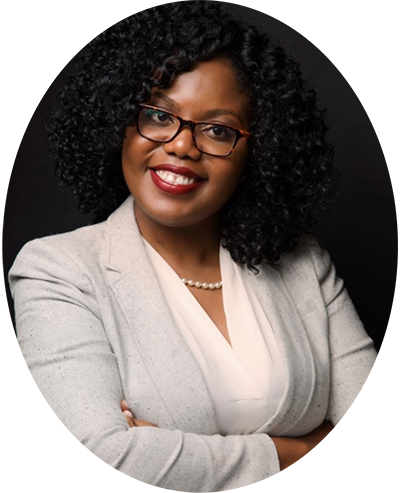
Since our last newsletter, it feels in many ways as if our world has been turned upside down. The human impacts of the decision from the federal government have been real, painful, and have been felt by nearly every team in our agency. Our Health Equity Division has been especially hit hard given that more than 50% of our operating funds came from these grants that were abruptly pulled back.
In a single day, we lost staff doing community engagement work, staff leading health equity communications, staff providing budgetary and fiscal support for our health equity work (like invoicing for grantees and contractors), staff supporting our advisory councils, and staff doing equity data and research. Many of these staff played key roles in nurturing authentic and trusted relationships with more than 40 longtime community partners.
These partners were serving as trusted conduits for health information and public health messages from across MDH programs, including information about measles prevention and other childhood immunizations. They were continuing to vaccinate some of our most vulnerable members of the community from COVID-19 and flu, averaging more than 1,700 vaccinations per month. The community engagement team also worked with partners to provide wholistic services like mental health support, food security services, immigration support, youth programs, and insurance and health care navigation, many of which have had to close their doors, reduce services, and/or lay off staff in the past few weeks due to the funding cuts. This work has now completely ground to a halt.
This loss of our trusted staff – many of whom have worked with MDH since the early days of the COVID-19 response – the loss of community partners, and the loss the services and trust in community is immeasurable. For the Health Equity Division, for the agency as a whole, and for our communities most impacted by inequities, the implications this dramatic loss will undoubtedly be felt for a long, long time.
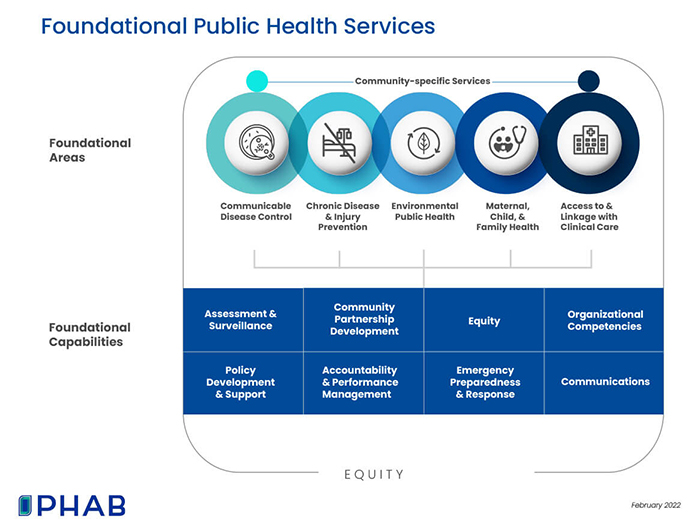 Amid all this loss, our team is focused on ensuring that equity remains at the core of what we do at MDH. As critical conversations are had and important decisions made at the agency, in the state legislature, with other funders, and in national circles, we must be steadfast in our advocacy that equity remain front and center of our priorities. I’m grateful that in 2022, the national Public Health Accreditation Board recognized equity as one of eight capabilities of foundational public health services (depicted in the image above).* This means that, as a cross-cutting skill and capacity, they recognize the critical role equity plays in ensuring community health and wellbeing across all of the work we do at MDH. It’s not a nice-to-have add-on; it’s an essential pillar of our work. It cannot be swept under the rug.
Amid all this loss, our team is focused on ensuring that equity remains at the core of what we do at MDH. As critical conversations are had and important decisions made at the agency, in the state legislature, with other funders, and in national circles, we must be steadfast in our advocacy that equity remain front and center of our priorities. I’m grateful that in 2022, the national Public Health Accreditation Board recognized equity as one of eight capabilities of foundational public health services (depicted in the image above).* This means that, as a cross-cutting skill and capacity, they recognize the critical role equity plays in ensuring community health and wellbeing across all of the work we do at MDH. It’s not a nice-to-have add-on; it’s an essential pillar of our work. It cannot be swept under the rug.
In the days and weeks ahead, I encourage folks to join their voices with ours to make sure health equity and the important community work we started does not get left behind. It’s undeniable that the federal funding cuts will take our system of public health backwards and make Minnesota communities and families less safe. How we fight back and build back from this setback is up to us.
At the Health Equity Strategy and Innovation Division, we are leaning into what makes our work meaningful: strengthening internal and external partnerships, investing in our regional and community engagement, and staying closely aligned with MDH’s strategic plan. We are also holding space to listen and learn with community-based organizations, local public health partners, and other state and federal partners to navigate change thoughtfully and collaboratively. This is a time to clearly define who we are in this work—to center our identity in health equity—and ensure our strategies not only reflect that identity but also protect and strengthen it for the future.
Odichinma (Odi) Akosionu-DeSouza (she/her)
Division Director
*Image Credit: Public Health Accreditation Board. Foundational Public Health Services. February 2022.
CONNECT
We are a network hub – leading, connecting and strengthening networks of health equity leaders and partners across MDH and Minnesota communities.
Minnesota Health Equity Networks: Driving change and building health equity through connection
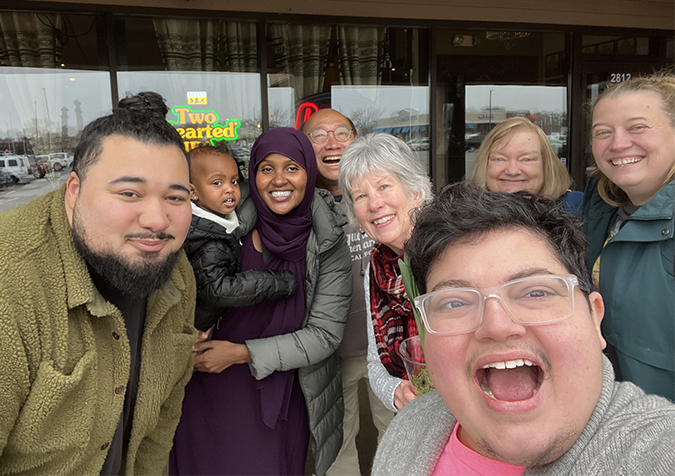
“No one knows everything, but together, we know a lot.” This simple belief is fundamental to the Minnesota Health Equity Networks, a statewide initiative built on the power of connection. In January of this year, we welcomed the MDH team that drives this work into our Health Equity Division. Their work focuses on strengthening connections and advancing health equity across Minnesota, which aligns well with the work of our division.
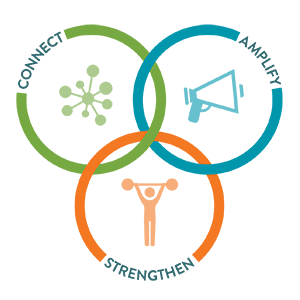 Formed three years ago in response to lessons learned from COVID-19, the networks team fosters collaboration among community organizations, leaders, and public health professionals. For the team, connection is more than a goal — it’s a core value. They are building relationships that drive change, tailoring their approaches to reflect regional needs, and hosting local and statewide gatherings that spark powerful discussions, effectively redefining what it means to work in public health. Their approach ensures that the communities most affected by health disparities are not only heard but are leading the way in shaping solutions.
Formed three years ago in response to lessons learned from COVID-19, the networks team fosters collaboration among community organizations, leaders, and public health professionals. For the team, connection is more than a goal — it’s a core value. They are building relationships that drive change, tailoring their approaches to reflect regional needs, and hosting local and statewide gatherings that spark powerful discussions, effectively redefining what it means to work in public health. Their approach ensures that the communities most affected by health disparities are not only heard but are leading the way in shaping solutions.
Another key part of the networks’ approach is a commitment to learning together. Rather than approaching the work as experts with all the answers, the team fosters an environment where knowledge is shared, diverse perspectives are valued, and collective action is encouraged. Unlike traditional hierarchical structures, the networks thrive as an interconnected web of relationships, ensuring that solutions are not imposed upon communities, but rather they emerge from within them.
Each network coordinator is deeply rooted in their region, building trust and credibility with the communities they serve. Living and working locally gives them firsthand insight into the unique strengths and challenges of their communities. By listening to community concerns, coordinators ensure their work addresses real needs rather than assumptions. Their tailored approaches reflect the specific priorities of each region, making their efforts more effective and impactful.
For example, Colleen McKinney, the Northeast Regional Networks Coordinator, has become more attuned to the urgent need for stronger advocacy and support for older populations, particularly in rural Minnesota, through her involvement with the Arrowhead Area Agency on Aging. “Agencies like this play a crucial role in addressing the needs and concerns of people who have longevity, including maintaining a focus on access to essential services.” Colleen shares, “And beyond that, groups like their Changemakers Cohorts are working to reframe the narrative around aging and help communities become more age-friendly.”
The networks also encourage cross-regional collaboration, allowing for ideas and best practices to flow across different areas of the state. Lyndsey Reece, the coordinator for the Southeast region explains, the team’s cross-regional approach as “a forum or roundtable, serving as a space where organizations can come together, share insights, and learn from one another’s successes.” Ben Cahill, the coordinator for the Northwest region, emphasizes the power of collaboration between metropolitan and rural communities, noting that, “these connections often lead to fresh perspectives and innovative solutions to long-recognized health equity challenges.”
The team’s regional and statewide gatherings provide a platform for public health professionals and advocates to share strategies, exchange ideas, and drive collective action. These gatherings have sparked new collaborations, deepened understanding, and celebrated the work of those advancing equity. With hybrid options available, the team strives to ensure all voices are heard, reinforcing its commitment to inclusion and connection.
Want to get involved? The networks team invites you to subscribe to their monthly newsletter, attend a regional or statewide gathering, or connect directly with members of their team. Together, we can create a Minnesota where every community can thrive.
STRENGTHEN
We provide leadership in advancing health equity and cultivate health equity leaders within MDH and across Minnesota communities.
Grantee Spotlight: Breaking Barriers, Building Community, and Empowering Somali Women
On a quiet Friday afternoon, in the corner of a south metro library, you might find Niema Ismael gathered with her team. As the founder of the Women's Wellness and Parenting Support Center (WWPSC), she meets with members of her community, creating a space of trust, care, and belonging. In these meetings, stories are shared, struggles are acknowledged, and healing begins.
Founded in 2022, WWPSC is dedicated to empowering Somali women. The organization was recently able to grow through the MDH Capacity Strengthening Initiative. “The MDH Capacity Strengthening Initiative has helped our organization to expand our network, enhance outreach, and improve capacity building. This support enabled the expansion of initiatives and materials, ensuring continued growth and adaptability to our community needs.” Niema said.
WWPSC provides educational and treatment services, including individual and group therapy, designed to address the unique cultural experiences of Somali women. "Our mission was to actually create a space where Somali women's health would be a priority and space where they would [feel like they were] being seen," Niema said.
WWPSC focuses on addressing Somali Women’s maternal health issues, such as miscarriages, infertility, infant and child loss, postpartum depression psychosis, cultural shaming and biases, and family therapy. These issues often go unspoken within the Somali community, but WWPSC is working to change that.
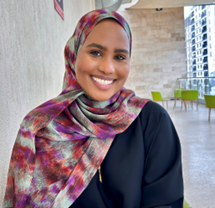 "By creating a community where individuals feel understood and supported, we aim to foster a sense of belonging and connection," shared Niema. WWPSC’s vision is not just about providing therapy—it’s about transforming lives. The organization is committed to reducing maternal health disparities and breaking the silence around mental health struggles, ultimately lowering the rate of suicide attempts among Somali women.
"By creating a community where individuals feel understood and supported, we aim to foster a sense of belonging and connection," shared Niema. WWPSC’s vision is not just about providing therapy—it’s about transforming lives. The organization is committed to reducing maternal health disparities and breaking the silence around mental health struggles, ultimately lowering the rate of suicide attempts among Somali women.
Niema’s passion for this work began when she was working at Fairview Hospital. "I noticed a number that I wasn't expecting of Somali women who were dealing with postpartum depression or general depression, but whenever they got prescribed [an] antidepressant it would be 'oh, my partner threw it away,’ or ‘oh, I didn't even pick that up because I'm not that ill to [need] medication or talk to someone,’ or ‘I don’t want to be in low faith.’ Because the providers they were seeing didn’t understand the Somali culture, there was a disconnect,” Niema recalls.
This realization led Niema to create Circle of Healing, a program where Somali women could come together in a culturally sensitive space to share their experiences, express their emotions, and begin the healing process. What started as a small support group quickly grew into a larger movement.
“It became my mission to create a space where the culture was tailored into every program," Niema said. "We needed a space where cultural understanding was woven into every program."
To support Somali women and their families, WWPSC offers six specialized programs: Circle of Healing, Individual Therapy, Integrative Family Therapy, Invisible Art Therapy, Infant & I, and Project Care – an opioid outreach initiative. Through evidence-based therapy and support, licensed practitioners help women heal and provide a safe environment for their children’s development.
Beyond therapy, WWPSC also publishes a monthly newsletter in Somali and English. The newsletter covers topics like cultural shame, abusive relationships, and gender biases within the Somali community. “What makes us unique is that we’re not just women helping women—we’re Somali women challenging cultural stigmas and redefining what happiness means in our community," Niema explained.
As WWPSC continues to grow, the next step is securing a permanent space. Currently, the organization rents space based on availability, but a dedicated location would allow for expanded services and more consistent support. "Everyone on my team is a licensed mental health practitioner volunteering their time, so it is limited hours right now," Niema shared. “[Having a dedicated space] would create more healing [for the women], to know that this place is secure for them. So that is the one aspect that we are still working toward."
Niema shared that there are many ways to support WWPSC; whether through volunteering, spreading awareness, or donating, every effort helps Somali women receive the care they deserve. To learn more or get involved, reach out at wwwpsc.mn@gmail.com or visit their website at https://www.wwpscmn.org/.
To learn more about other Capacity Strengthening Initiative grantees, visit the Capacity Strengthening Grantee Initiatives page.
AMPLIFY
We amplify the work of communities most impacted by health inequities and support them to drive their own solutions.
The Family Support Organization Collaborative:
Connecting, collaborating, and strengthening partnerships to improve systems for children and youth with special health needs and disabilities and their families
By Heather Stillwell, caregiver and community impact coordinator, and Sarah Dunne, systems transformation unit supervisor, of the MDH Children and Youth with Special Health Needs and Disabilities Section
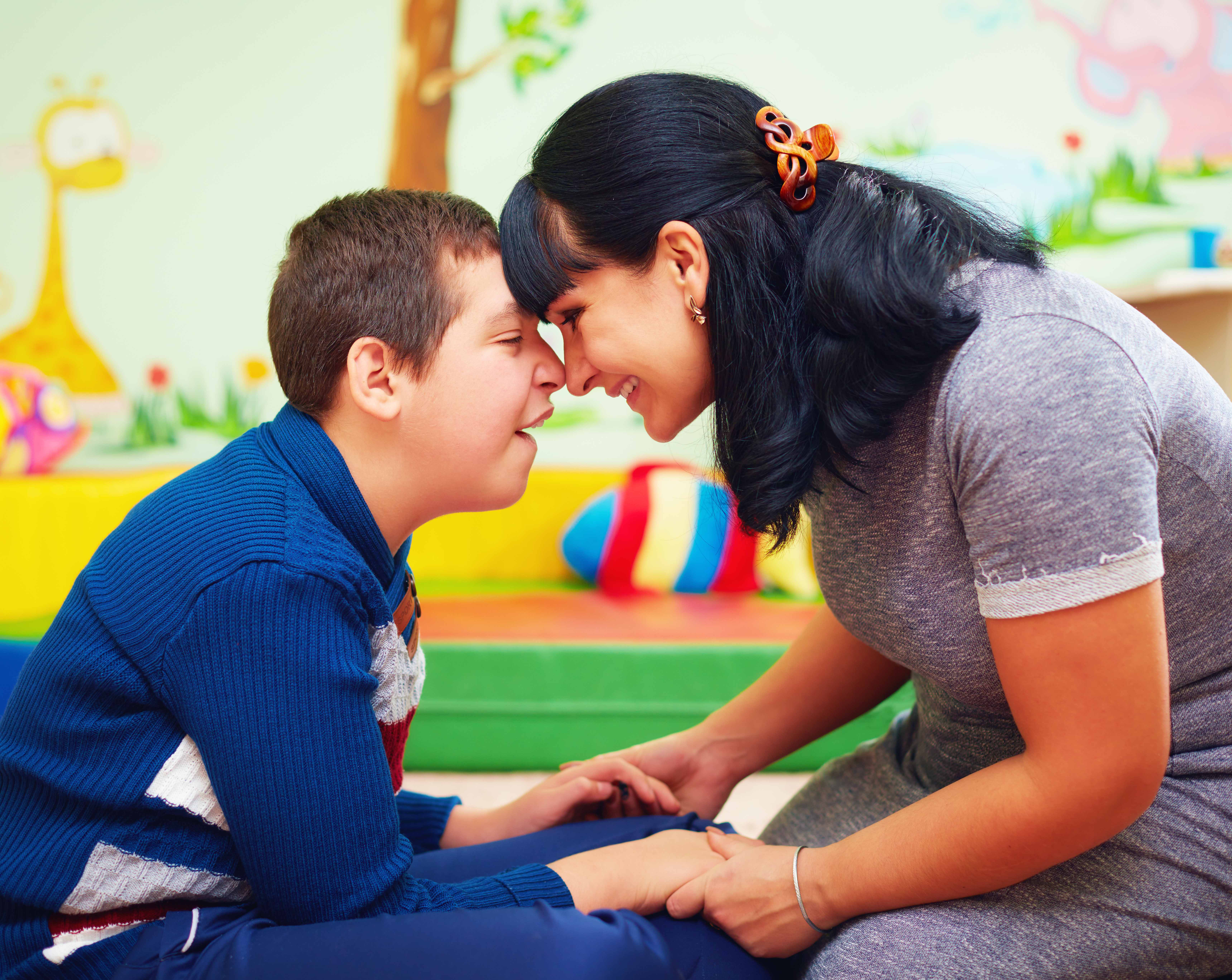 Families raising children and youth with special health needs and disabilities often navigate complex systems to access the care and resources they need. Family support organizations play a critical role in guiding families through these systems, offering advocacy, emotional support, and connections to vital resources.
Families raising children and youth with special health needs and disabilities often navigate complex systems to access the care and resources they need. Family support organizations play a critical role in guiding families through these systems, offering advocacy, emotional support, and connections to vital resources.
In 2023, the Children and Youth with Special Health Needs and Disabilities (CYSHND) section at the Minnesota Department of Health (MDH) completed an environmental scan, engaging over 45 family support organizations. These organizations expressed a strong desire for deeper collaboration and authentic partnerships with MDH. In response, MDH launched the Family Support Organization Collaborative (FSOC) – a collective of organizations working together to ensure families have access to the resources, advocacy, and community connections they need. The FSOC is designed to:
- Connect organizations with peers for relationship-building and knowledge sharing.
- Collaborate on solutions that address the needs of families in Minnesota.
- Strengthen partnerships with MDH’s CYSHND Section, helping guide its priorities and plans.
The FSOC hosts virtual gatherings every other month, creating a space for peer learning, sharing successes and best practices, and fostering mentorship among organizations. These gatherings strengthen individual organizations while building a more connected network of family support across Minnesota. The FSOC also maintains an online collaboration hub, providing members with tools, resources, and a shared calendar of events.
At its core, the FSOC works to advance health equity by amplifying the voices, strengths, and leadership of historically under resourced organizations and the families they serve. By centering community engagement and promoting power-sharing in decision-making, the FSOC directly addresses structural racism and systemic inequities. Ensuring that organizations serving marginalized communities have equitable access to resources leads to stronger, more sustainable outcomes for families.
If you represent an organization that supports families of children and youth with special health needs and disabilities, we invite you to join the FSOC. Together, we can build a more connected, informed, and empowered community.
For more information contact Heather Stillwell, Caregiver and Community Impact Coordinator, at heather.stillwell@state.mn.us or visit the Family Support Organization Collaborative webpage.